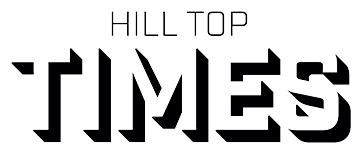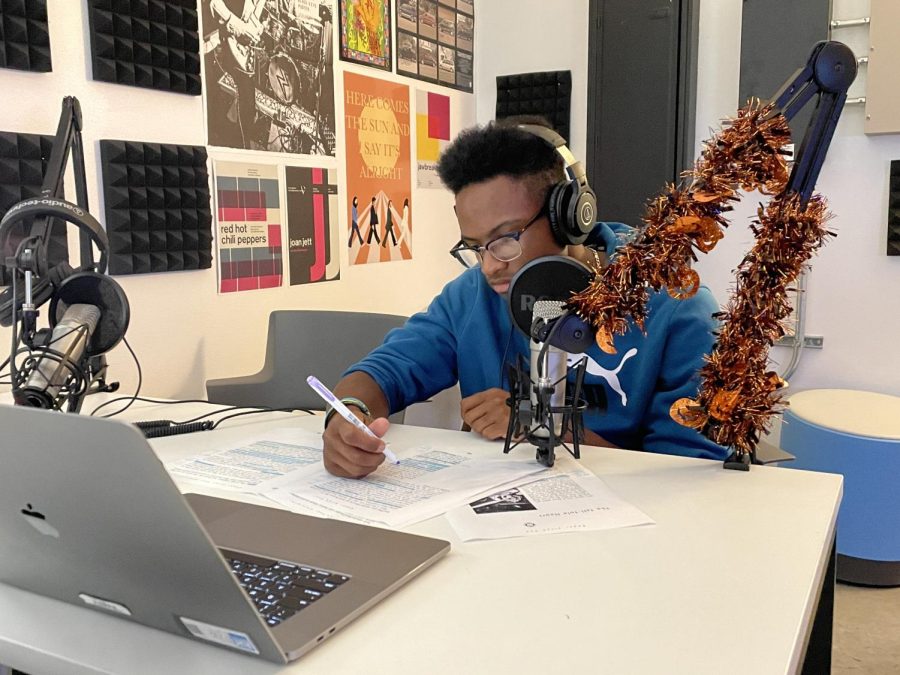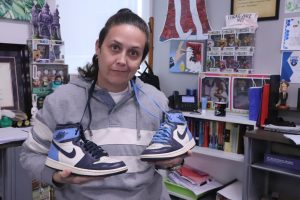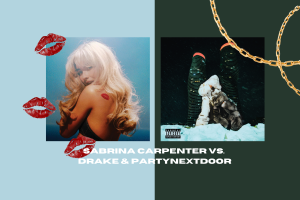Rock Hill Radio lays foundation for future careers, revives dwindling industry
Senior Aiden Brackens edits part of a script for his Spooky Stories assignment in Rock Hill Radio / Digital Audio Technologies class.
January 5, 2023
The click of the recording sign’s “on” switch, illuminating the hallway with red to let others know we are “on air”. The smooth glide then hitch of the Zoom live track boards sliders as they are pushed into place at -6 decibels. Or even the soft screech emitted from the mic stand while the microphone is pulled to a radio student’s lips. This is what happens inside the radio room but what about the things that radio does for our students outside of the room?
The Digital Audio/Radio program allows students to experience what it’s like to be a radio host in the real world. It offers students a head start in viewing careers they wish to pursue in the future.
“I think it’s an important course for [students] that want to specifically go into the radio technology part of their career or even anyone that wants to go into technology,” senior and Rock Hill Radio station director Aiden Brackens said. “It helps [you] to experience what it’s like in the real world but in a safe environment where if you mess up you have a chance to correct your mistakes.”
Not only does radio offer hands-on experiences, but it also helps lay down a foundation of knowledge needed for industry standards across the world. This in turn makes it so that students have better chances when applying for jobs, internships, and college applications.
“When going on contract gigs it always helps as a lighting technician and designer to know a little bit extra about audio,” senior and Rock Hill Radio program manager RJ Ruzika said.
Ruzika works as a lighting designer for Fellowship Church and freelances as well. Radio gives him a better understanding of how sound is created in order to make intricately designed scenes. His radio expertise also allows him to design along with the music rather than just randomly while he is in charge of lighting during every show/service. Giving his designs more depth and causing a bigger effect on the audience.
Being able to listen to something and understand the process behind how it was produced allows radio students to then be able to apply that to their own lives and careers.
“One of my favorite things about radio is that it has given me the knowledge of how things work and I think that is extremely valuable,” Ruzika said. “Just to be able to listen to something and pick up on little things that no one else does.”
Above all else, radio has practical use in the real world. Many believe that radio is a dying art form, with platforms like Spotify or Apple Music becoming increasingly popular. Though, there are some things that radio will always offer when it comes to safety, availability, and cost.
“Radio is important because it is a piece of news. Now, obviously, we have Spotify, iHeartRadio, and Apple Music, but you need the radio to hear certain news and other things,” Brackens said. “You can see news on TV, the internet, and everywhere else but if you’re on the road, the radio is necessary in order to [stay] informed and safe,”
Radio also can be considered better than online platforms because of its availability. You can tune into a radio station almost everywhere in the world due to the wide range that radio waves cover when being broadcasted. Whereas online services you must have cellular service to use. Also you will never have to pay to tune into radio stations. As long as you are within the broadcasting tower’s range, you may listen for free because radio stations are free to the public.
“Radio is something that will not be going anywhere, despite the views of some of my peers, and that is due to the immense importance that it holds in our society,” Brackens said.








